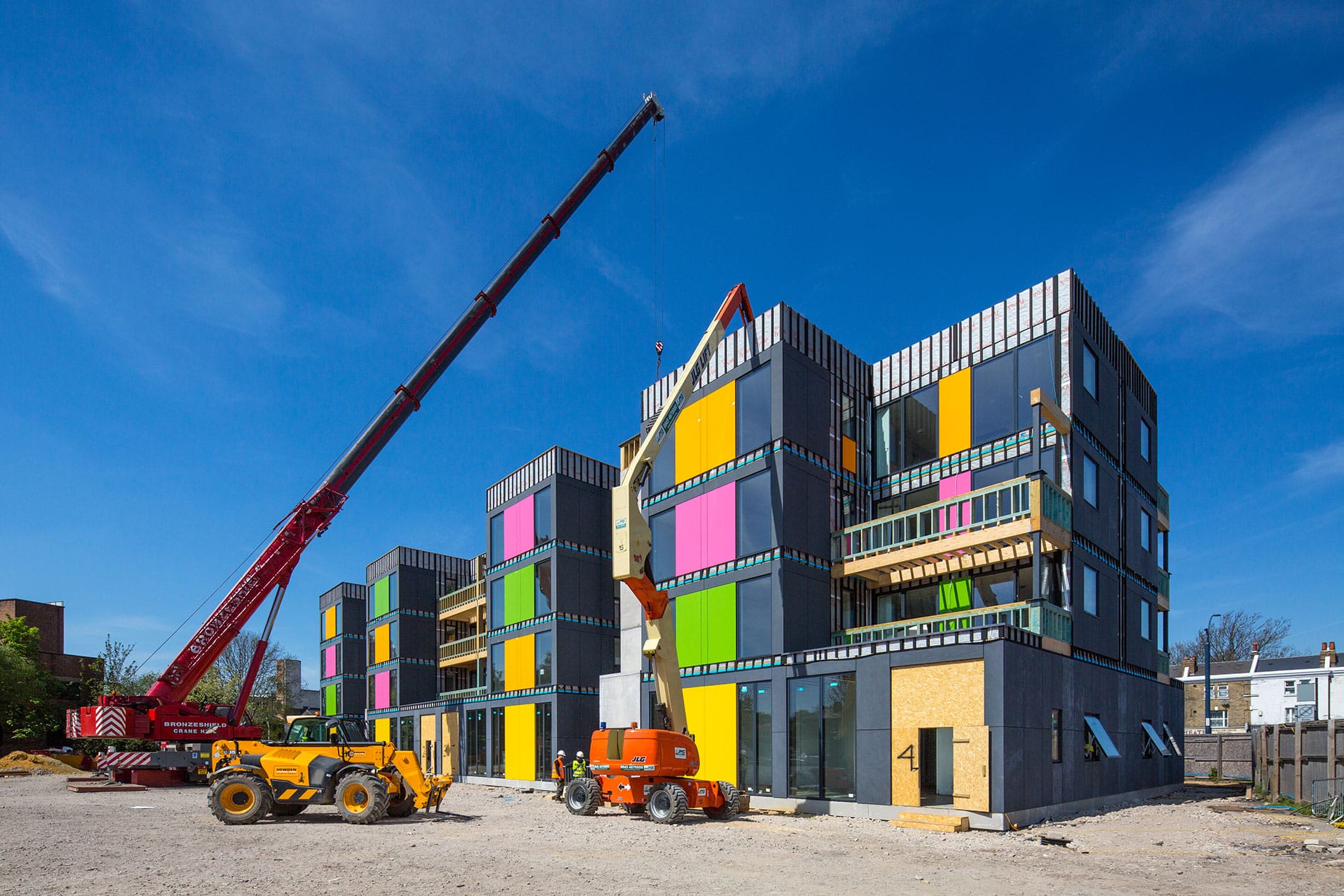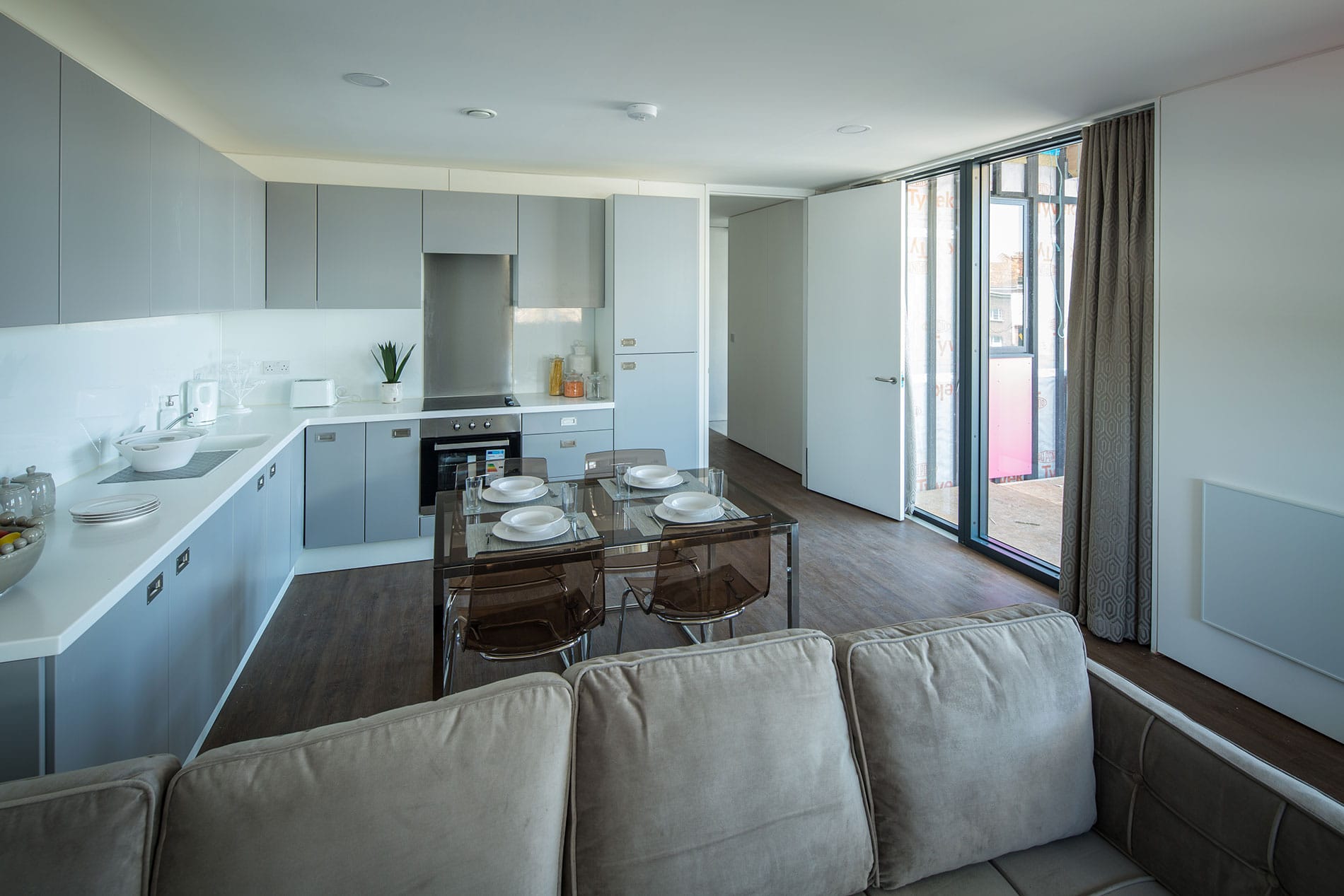What’s the best way to tell area residents about plans for a new asylum shelter nearby?
The government should tell communities directly about plans for new asylum shelters, some activists and politicians say.
The council is looking at putting up multi-storey buildings in the city centre made of stackable prefab homes. But there’s still a lot we don’t know about its first batch of rapid-build homes.

Dublin City Council hopes to suggest a number of pilot schemes for more rapid-build and stackable homes in the coming months to deal with the homelessness crisis.
That’s what the executive manager of the council’s housing department, Anthony Flynn, told councillors at their housing committee meeting Friday.
Those at the meeting also discussed the merits of a stackable-housing project in London, and the latest on the troubled effort by Western Building Systems to put up rapid-build housing in Poppintree before Christmas 2015.
Among the many aims in Minister for Housing Simon Coveney’s housing plan are to only use emergency accommodation for homeless families in limited circumstances by mid-2017, and to construct 1,500 new rapid-build homes by 2018.
So, right now, the council is looking at whether it can increase housing supply in the city centre by putting up rapid-build multi-storey buildings.
Such buildings have got a few pluses, said Flynn. For a start, they could be used in cases where the council is pulling down and rebuilding old complexes, by moving tenants to nearby stackable units while they carry out the development, he said.
Or, they could be used in unused patches in the city centre or “infill” sites. “It gives us a great opportunity on vacant lands,” said Flynn.
“We feel, in the housing department, that that opportunity is on our doorstop and in the next number of months we’d like to bring a number of pilot schemes forward for rapid-build and stackable units,” said Flynn.
Some of the inspiration for the move to look at stackable, modular units comes from Lewisham Borough Council in the UK.

On 21 July, a group of council officials, architects and engineers — including from Rogers Stirk Harbour + Partners — who had all worked on a pilot rapid-build housing project of 24 homes in Lewisham visited Dublin to talk about how they did it.
There are 50,000 homeless families in temporary accommodation in London, said Jeff Endean, head of housing strategy at Lewisham Borough Council.
It’s such a struggle to find places for them that many live in bed and breakfasts in seaside towns across the south of England in the off-season, and their kids commute to school in the city.
The Lewisham stackable homes are essentially boxes made in a factory, deployed on a site to provide housing for homeless people, said Endean.
“If they can be stacked, the concept is they can be unstacked again and moved somewhere else,” he said.

They meet fire-safety standards and energy-efficiency standards and can be moved between sites four or five times, said John Green from SIG Building Systems, who also worked on the project.
Like Dublin City Council, Lewisham Borough Council was looking at ways to spend money on homes rather than hotels. “This is a project that pays for itself,” said Endean.
The 24 stackables last for 60 years and cost about £150,000 a unit. Moving people into them means the council isn’t paying for unsuitable bed and breakfasts – instead, it’s getting paid rent.
“If you pay back the cost of the capital that we put in, it makes a surplus from rent of £85,000 a year, so it’s paying for itself, it’s actually driving a revenue for the council,” Endean said.
They had an extensive public consultation to make sure the public was on board, he said. They asked people what they wanted on the ground floor and responded to that, putting in a small cinema and a work place for small businesses.
People Before Profit Councillor John Lyons asked whether the building value depreciates over time, and others asked why they are temporary.
“A verbal value has been put on as £700,000 per unit,” said John Green of SIG Building Systems. “That should really quash the depreciation element of it.”
Green said they’re temporary in the Lewisham site because that’s what the council needs there.
It’s a site that might be a tube station later, so if they built on it they would lose that long-term strategic use. They might later move the homes to another site where they would be permanent, he said.
As Sinn Fein’s Daithi Doolan sees it, the stackable units have the potential to counter complaints about where rapid-build homes have been put so far.
“It actually answers some of the concerns that people have been talking about in the last 12 months,” said Doolan. “They won’t just be in working-class suburbs. We’re now going to put smaller units in the inner-city.”
“You’ll occupy sites that are currently only open for anti-social behaviour,” he said.
Even as the council pushed forward with new projects, though, there are still unanswered questions about the first round of rapid-build housing built by Western Building Systems in Poppintree earlier this year.
“I’m supportive of rapid-build, and the quicker we get it built,” said Sinn Fein Councillor Criona Ni Dhalaigh at Friday’s meeting. “But I’m also concerned because so far it hasn’t been very positive in that delay after delay after delay. Are we sure that we have this right now?”
The council has yet to release a cost-benefit analysis explaining how the decision to build rapid-build homes compares to other options — like building traditional homes or acquiring more existing homes than they already are. And we still don’t know the final bill for the housing in Poppintree, Ballymun.
“When the final account is agreed, we will provide you with the costs in relation to Ballymun,” said Anthony Flynn, the executive manager of the council’s housing department.
“The dispute resolution process has been enacted by the contractor,” said Flynn. The council is going to conciliation, and it might go to arbitration. “An arbitrator will agree what the final cost will be. That’s where it’s at at this minute, unfortunately, but we’re in dispute at this time.”
The head of the housing committee, Sinn Fein’s Daithi Doolan, said the council can’t afford to sit back and do nothing, despite the difficulties. “We’re always learning from making mistakes but the emergency is so great that we need to press on,” he said.
Also, the modular housing in Cherry Orchard has, so far, been quite successful, said Doolan. “The houses in the area actually see it as part of the solution to tackling anti-social housing in the area.”
The dispute over the Poppintree rapid-build homes is not the first one the government and Western Building Systems have had over a contract. The Office for Public Works is currently involved in legal proceedings that relate to a project built by Western Building Systems.
In 2009, the National Standards Authority of Ireland (NSAI) carried out an inspection of Whitehall College of Further Education, which had been designed and built by Western Building Systems.
The NSAI and the Office of Public Works both refused to release a copy of the inspection report under the Freedom of Information Act, though, because of an ongoing legal process.